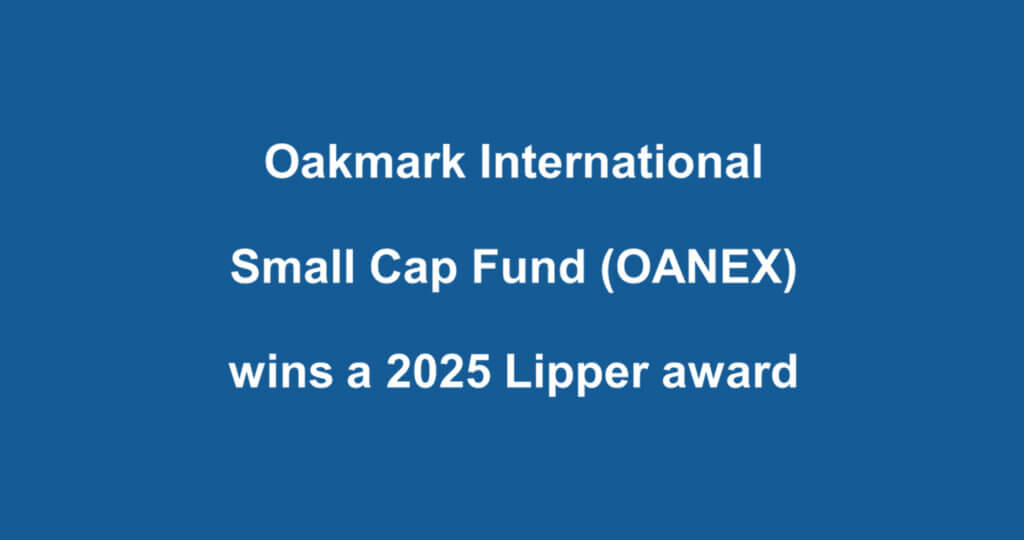Oakmark International Small Cap Fund - Investor Class
Average Annual Total Returns 06/30/13
Since Inception 11/01/95 10.09%
10-year 11.78%
5-year 6.34%
1-year 20.79%
3-month 1.28%
Gross Expense Ratio as of 09/30/12 was 1.41%
Past performance is no guarantee of future results. The performance data quoted represents past performance. Current performance may be lower or higher than the performance data quoted. The investment return and principal value vary so that an investor’s shares when redeemed may be worth more or less than the original cost. The performance of the Fund does not reflect the 2% redemption fee imposed on shares redeemed within 90 days of purchase. To obtain the most recent month-end performance data, view it here.
The Oakmark International Small Cap Fund returned 1% for the quarter ended June 30, 2013, outperforming the MSCI World ex U.S. Small Cap Index, which declined 3% for the same period. For the calendar year 2013, the return was 7%, compared to 4% for the MSCI World ex U.S. Small Cap Index.
The top contributing stock for the quarter was Swiss freight forwarding company Panalpina Welttransport. A CEO transition at Panalpina was the likely catalyst behind the company’s strong quarterly returns. As we’ve written about in the past, Panalpina, despite having one of the most attractive global networks in the freight forwarding industry, has reported margins well below its peers in recent years. In April Panalpina announced that Peter Ulber would succeed Monica Ribar as CEO, effective June 1. Peter was the COO of Panalpina’s highly respected competitor Kuehne and Nagel (a name we currently own in the Oakmark International Fund) until mid-2011. He’s regarded as one of the best managers in the forwarding sector and has experience in both the ocean and air markets. Peter’s leadership, in combination with other recent management changes, including a new CFO and head of Americas (both also from Kuehne and Nagel), have significantly improved Panalpina’s senior management team. Although it will take many years to turn the business around, we now believe Panalpina has a management team with sufficient industry experience to generate financial performance more in-line with its peers.
Another top contributor for the quarter was Orbotech, an Israeli firm that designs, develops, manufactures, markets and services automated optical inspection systems and imaging solutions. The company is the world leader in inspection equipment for printed circuit board (“pcb”) and flat panel displays (“fpd”). The pcb market continues to grow, and although the fpd market was very weak last year, it is stabilizing as a result of strong demand for smartphones. Thus, Orbotech’s sales exceeded market expectations, and Orbotech reported first-quarter revenues of nearly $96 million and net income of $5 million, both greater than market estimates. Earnings per share were well ahead of the previous quarter and the year-ago period. The company’s new CEO, Asher Levy, indicated that second quarter revenue would be approximately $105 million – a significant increase over recent quarterly revenue amounts. These results are due to Levy’s aggressive cost-cutting plan, which boosted the company’s fdp business, improvements to Orbotech’s balance sheet and better industry conditions.
The largest detractor for the quarter was Myer Holdings, a large department store group from Australia. In last quarter’s report we wrote about Myer because it was the Fund’s top contributor. However, this quarter Myer released its third quarter sales results, which fell somewhat short of our estimates and disappointed the market. Overall sales advanced, and like-for-like sales grew, making this the fourth consecutive quarter of positive comparable sales. However, like-for-like sales growth slowed compared with the previous quarter. This is partly due to the challenging Australian economic environment, which is grappling with approaching elections and consumers who are reluctant to spend. In addition, management has become more focused on increasing growth after having been extremely cost-focused in recent years. We believe the company is positioned well for an improvement in consumer sentiment, which will help if price competition increases due to poor winter weather and weak inventory positions at competitors. Myer remains a well-run business that generates cash, and we are optimistic about its prospects.
We added two securities to the Fund. From France we purchased shares in CGG, an operator and provider of seismic acquisition and data processing services, and from Hong Kong we purchased Hengdeli Holdings, the largest wholesaler and retailer of luxury watch brands in China. We sold Toyota Industries and Countywide during the quarter.
Because we continue to believe that the U.S. dollar remains weak against some currencies, we maintained hedge positions on five of the Fund’s currency exposures. At the recent quarter end, we had hedged 48% of the Fund’s Australian dollar, 58% of the Norwegian krone, 21% of the Swiss franc, 9% of the Japanese yen and 32% of the Swedish krona exposures.
We thank you for your continued confidence and support.
As of 6/30/13, Panalpina Welttransport. Holding AG represented 2.5%, Kuehne + Nagel International AG 0%, Orbotech, Ltd. 2.2%, Myer Holdings, Ltd. 2.2%, Compagnie Générale de Géophysique Veritas (CGG) SA 0.6%, Hengdeli Holdings, Ltd. 0.7%, Toyota Industries Corp. 0%, and Countrywide PLC 0% of the Oakmark International Small Cap Fund’s total net assets. Portfolio holdings are subject to change without notice and are not intended as recommendations of individual stocks.
For a full list of The Oakmark International Small Cap Fund’s holdings as of 6/30/13, click here.
The MSCI World ex U.S. Small Cap Index (Net) is a free float-adjusted market capitalization index that is designed to measure global developed market equity performance, excluding the U.S. The MSCI Small Cap Indices target 40% of the eligible Small Cap universe within each industry group, within each country. MSCI defines the Small Cap universe as all listed securities that have a market capitalization in the range of USD200-1,500 million. This benchmark calculates reinvested dividends net of withholding taxes using Luxembourg tax rates. This index is unmanaged and investors cannot invest directly in this index.
Investing in value stocks presents the risk that value stocks may fall out of favor with investors and underperform growth stocks during given periods.
The stocks of smaller companies often involve more risk than the stocks of larger companies. Stocks of small companies tend to be more volatile and have a smaller public market than stocks of larger companies. Small companies may have a shorter history of operations than larger companies, may not have as great an ability to raise additional capital and may have a less diversified product line, making them more susceptible to market pressure.
Investing in foreign securities presents risks that in some ways may be greater than U.S. investments. Those risks include: currency fluctuation; different regulation, accounting standards, trading practices and levels of available information; generally higher transaction costs; and political risks.
The discussion of the Fund’s investments and investment strategy (including current investment themes, the portfolio managers’ research and investment process, and portfolio characteristics) represents the Fund’s investments and the views of the portfolio managers and Harris Associates L.P., the Fund’s investment adviser, at the time of this letter, and are subject to change without notice.







